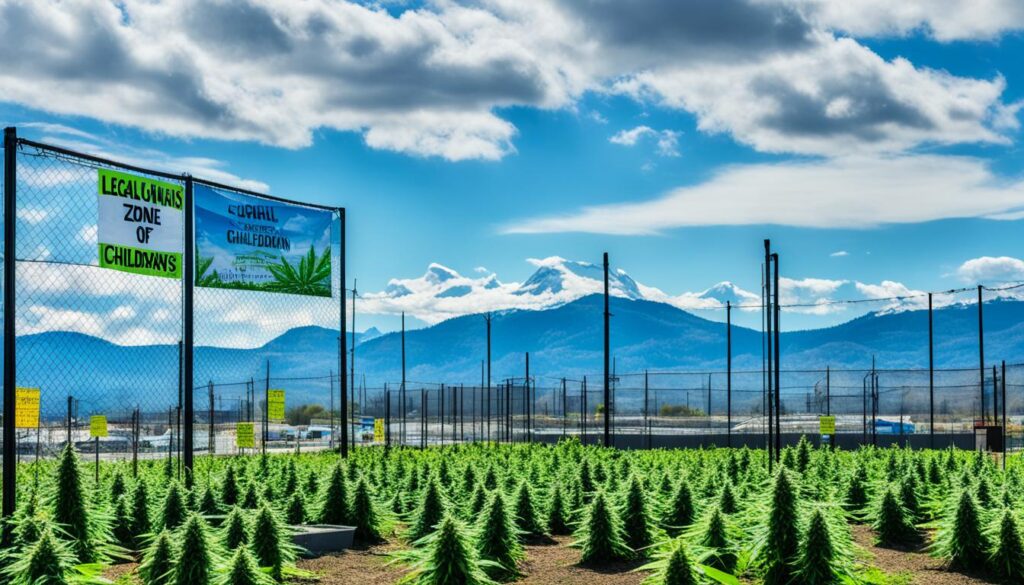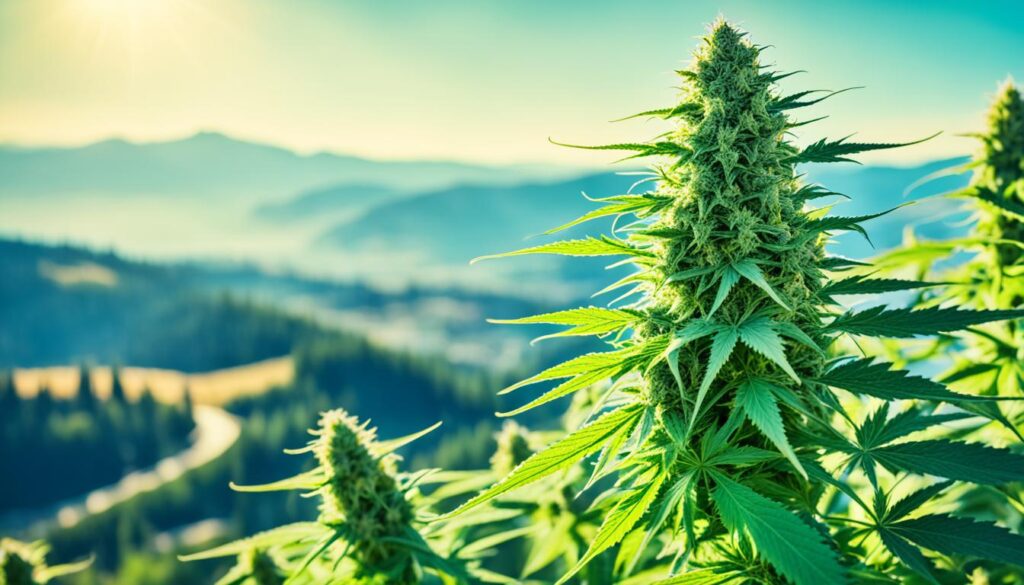When you enter Larisa, Greece, you’ll see how cannabis is a big part of the culture. It’s found in secret grows and changing laws. Let’s explore this exciting world of cannabis together.
Larisa is famous for its history and beauty. It’s also a key place for growing and sharing marijuana. The good weather and rich soil here make it perfect for growing weed, even with legal issues.
In Larisa, people love the many uses of cannabis. They see it as more than just a drug. It’s for health, cooking, and showing creativity. This shows how Larisa values freedom and new ideas.
Key Takeaways
- Larisa, Greece, has a thriving underground cannabis cultivation scene, taking advantage of the region’s favorable climate.
- The local community has embraced the diverse applications of marijuana, from therapeutic benefits to innovative culinary creations.
- The evolving legal landscape surrounding cannabis in Larisa presents both challenges and opportunities for the growing industry.
- Weed in Larisa has become a symbol of personal freedom and a catalyst for innovation within the community.
- Navigating the nuances of the local cannabis culture requires an open and informed approach to fully appreciate the depth of this unique landscape.
The Rise of Cannabis Activism in Colorado
Colorado has led the way in making cannabis legal. Larisa Bolivar, a big name in activism, started the Cannabis Consumer Coalition. She works hard to make sure the cannabis industry is honest and fair.
Larisa Bolivar: A Warrior on the Front Lines
Larisa Bolivar has been fighting for cannabis rights in Colorado for over 10 years. She founded the Cannabis Consumer Coalition to protect users and keep the industry honest. Her work has exposed big problems like pesticides in cannabis, leading to new rules.
Paving the Way for Drug Reform
Colorado made history with Amendment 20 in 2000, legalizing medical marijuana. Since then, it has kept pushing for more cannabis freedom. This has changed Colorado and inspired others to follow.
| Metric | Value |
|---|---|
| American cannabis industry revenue in 2018 | $10 billion |
| Average annual revenue per U.S. dispensary | $3 million |
| Percentage of women in cannabis executive roles in 2015 | 36% |
| Percentage of women in cannabis executive roles in 2019 | 17% |
| Percentage of women-owned cannabis businesses in Massachusetts | 4.7% |
| Percentage of women-owned businesses in other industries in Massachusetts | 19.3% |
| Percentage of women executives in cannabis product testing laboratories in 2015 | Over 60% |
Colorado’s cannabis journey is big, thanks to activists like Larisa Bolivar. Her work and the push for Psilocybin legalization show how activism can change things. The fight for activism and drug policy reform in Colorado is still going strong.
Exploring the Legality of Cannabis in Colorado
Colorado’s journey with legal cannabis has been a wild ride. The state is still working to make a free and open market. The fight to connect the legal and black markets is ongoing.
Challenges in Creating a Truly Free Market
Colorado’s cannabis industry faces many rules and big company power. Multi-state operators (MSOs) are big and often block small businesses. This limits competition and choices for buyers.
Some people grow their own cannabis to dodge big company control. But, the industry’s growth has pushed out the people who started it. Now, big lawyers and lobbyists make policies for big companies.
Bridging the Gap Between Legal and Black Markets
Colorado still has a strong black market. The legal market’s competition makes prices low for buyers and small sellers. This makes the gap between legal and illegal markets bigger.
Grassroots groups are fighting for fair rules in the cannabis market. They want policies that help the community, not just big companies.
Colorado must find a way to balance big and small businesses and consumers. The lessons from Colorado will guide cannabis laws in the U.S.

“The cannabis industry in Colorado has provided the state with hundreds of millions of dollars in new tax revenue, allocated for education, transportation, and environmental protection initiatives.”
Lessons from Other States: Improving Cannabis Regulations
Colorado is learning from other states about how to make cannabis laws better. They’re looking at what works and what doesn’t. This is important for making sure the cannabis market is fair for everyone.
Social Equity: A Missed Opportunity?
Some states, like Illinois, focus on helping communities hurt by the past with their cannabis laws. Colorado hasn’t done as much in this area. This has made some feel like Colorado missed a big chance to help those communities.
Larisa Bolivar, a big voice for changing cannabis laws in Colorado, says the state is falling behind. It’s not focusing on helping the communities most hurt by the past. Instead, big businesses seem to run the show.
“Colorado is no longer leading in cannabis policy and business compared to newer states like Illinois, which have prioritized social equity in their regulations.”
Not focusing on helping these communities has caused big problems. They can’t easily join the legal cannabis market. This keeps the black market alive. People who used to sell cannabis illegally can’t get into the legal market.
Colorado needs to look at what other states have done right and wrong with cannabis laws. By focusing on helping communities hurt by the past, Colorado can make its cannabis industry fairer. This way, everyone in the community can benefit from legal cannabis.

weed in Larisa: The Underground Growers’ Perspective
In Larisa, a secret world of growing weed has grown. These growers work in secret and make the black market strong. They share their stories, showing the hard parts of their work.
Even though weed is legal in some places, these growers still work illegally. They say legal weed is too expensive and has too many rules. They face big risks, like finding safe places to grow and dealing with suppliers.
A grower in Larisa wants to stay secret: “The legal way is too hard for us. Taxes and rules are too much. We can’t beat the big companies and the risk of getting caught is too big. So, we work in secret to make more money and stay free.”
These growers face many problems. They worry about the police and must always change to stay ahead. But, they like the secret world for its freedom and money. The legal market doesn’t offer them what they want.
| Key Insight | Statistic |
|---|---|
| Transition to Legal Market | Around 10% of underground growers managed to successfully transition into the legal cannabis market. |
| Growers Leaving the Industry | Many growers, approximately 90%, did not stay in the industry after legalization. |
| Challenges in the Legal Market | High real estate prices in the early days led to situations where growers fell behind on rent or production, resulting in losing ownership of their grows. |
The Larisa growers are still a big deal as the legal weed market changes. Their stories show the hard parts of working in weed. They highlight the fight between illegal and legal weed growing.
“The legal market simply doesn’t work for us. The taxes, the licensing fees, the stringent regulations – it’s all too much. We can’t compete with the big players, and the risk of getting caught is just too high. So we’ve chosen to stay in the shadows, where we can operate more freely and keep our profits.”
The Larisa growers are still a big deal as the legal weed market changes. Their stories show the hard parts of working in weed. They highlight the fight between illegal and legal weed growing.
The Changing Dynamics of the Cannabis Community
The cannabis community in Colorado has changed a lot. It used to be united but now it’s more divided. This change came as the industry grew and more people joined.
Media attention and the desire for fame and money have played a big part in this change. These factors have hurt the activists and growers who started the movement.
From Unity to Fragmentation
Colorado’s cannabis community was once close, sharing a goal: making cannabis legal and accepted. But as the industry grew, things changed. More people came in with their own goals.
This led to the community breaking apart. Different groups fight for power and attention. The big companies focus on making money, which has split the community.
This industry fragmentation makes it hard for the community to work together. It’s hurting the progress made before.
The Impact of Media Attention and Egos
Legalizing cannabis brought more media attention. Journalists and influencers want to be part of the story. This has made some people in the industry focus on being famous and making money.
This has hurt the teamwork that was once key in the community. Activists and growers who led the legalization effort are now less important. Big companies are taking over.
“The cannabis community in Colorado has become a battleground, where egos and greed have overshadowed the ideals that once united us. It’s a far cry from the grassroots movement we once knew.”
We need to find a way to bring back the unity in the cannabis community. We must focus on the movement’s core values. We need to put the community first, not just our own goals.
The Future of Medical Marijuana in Colorado
Colorado’s cannabis industry is changing fast. The future of medical marijuana is at a crossroads. The bond between patients and caregivers is under threat as big companies take over.
Preserving the Patient-Caregiver Relationship
The personal bond between patients and caregivers is fading. These close relationships were key for giving care that fits each patient’s needs. But now, the focus is more on making money than on helping patients.
Colorado has 3,000 marijuana caregivers. Last year, the state made $44 million from pot taxes. Recreational pot is taxed about 30 percent. The state is trying to stop illegal. This worries about the future of the patient-caregiver system.
Defending Medical Marijuana from Corporate Interests
Big pharma is moving into medical cannabis. Companies like GW Pharmaceuticals want a piece of the growing market. This worries cannabis patient advocates. They fear big pharma will ignore the needs of medical marijuana users for profit.
We need to work together to save the patient-caregiver bond and protect medical marijuana. This way, medical cannabis can stay a good option for those who need it for health.
Conclusion
We’ve looked at the cannabis world in Larisa and Colorado’s changing industry. The path to legalizing weed is still long. Many states now allow it for fun or health reasons. But, there are still big hurdles to overcome.
Colorado shows us that legalizing weed can be tricky. Even with rules, some people still turn to the black market. We need smart rules that help everyone, not just some. By fighting for fairness, we can make sure everyone gets a piece of the pie.
The cannabis industry is always changing. We must stay alert and ready to adjust. By looking at what works in other places, we can make better rules. These rules should help the economy and change society for the better.
The future of weed in Larisa and everywhere else depends on us. We need to tackle the tough parts and make the cannabis world fair and lasting for everyone.

As a veteran weed smoker for over 30 years and been very clean for the last 3 years, I have been craving it.
One thing I’ve never done is consume it?
I came across SunJet Plug and thought mmmm how esp with legalities etc.
So I made the plunge and purchased 12 brownies, well within 30 mins it kicked in and it was immense as I had a whole one from the off 😜
The rest did not last a week I was having 2 a day and my wife lost me for a few days I was in my own world apparently.
Kudos to the Sunjet plug love em, the taste is a bit undesirable could do with a tweak or two other than that no complaints
Contact him on his telegram link: t.me/sunjetplug
His email : sunjetplug@gmail.com
Many many thanks.😁
Take note ,he does not have telegram channels
Sunjet plug is 100% legit.. I’m a repeat customer.. I’ve ordered 10+ times now, and I’ve never had an issue.. Great product, great service.
Sunjet plug is extremely trust worthy , they never fail in what ever product I order, and its always in my hands with an hour of ordering 99% of the time….. its honestly rare when its more than 2 hours and that’s only because its the weekend when ive orded or a national holiday is on or something lol …. brilliant service I’m probably pushing maybe 2 months with them and I’ve never been disappointed ❤️ my only recommendation would maybe do a stamp card to get something free after 5 orders or a loyalty bonus of some kind ❤️
Email sunjet.. sunjetplug@gmail.com